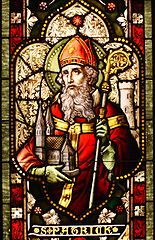
The Life And Writings Of Saint Patrick -Saint Patrick
II.—DOMNACH MOR MAIGE TOCHAIR
Domnach Mor Maige Tochair has given its name to the parish of Donagh, which comprehends some 25,000 acres of this wild but beautiful district; and it will never be forgotten by Irish scholars, for ‘it was on the lands of this very church,’ says John Colgan, ‘that I was born.’ Patrick’s memory, too, is still fondly cherished in this romantic glen, and every year great crowds of pious pilgrims assemble near the old Cross of Donagh to go their rounds of penance at ‘Patrick’s Bed’; nor is there in all Ireland a spot where the memory of their great Apostle is greener than in this wild mountain valley of far Inishowen.
He left there as bishop Cairthenn’s son, the brother of St. Mac Cartan of Clogher. The Tripartite, which is always candid, tells us then a story of these two prelates, which is not without a moral lesson for our own times.
When Patrick was biding at Ailech Airtich, in Tir Enda of Connaught, Enda, son of Niall, prince of the district, met Patrick one day; whereupon Patrick asked him for the place of a church therein for one of his familia. “As if we had not clerics of our own,” said Enda, “to put in the place.” The native chieftains were extremely jealous at seeing strangers assume the spiritual sovereignty in their tribe-land. So at first he refused Patrick for the church land; but he came next day, bringing with him his own one-eyed son, Eochy, ‘who rests in Inver.’ Patrick at the time was engaged elsewhere with most of his household ‘baptising and conferring Orders and sowing the faith.’ Not finding Patrick, Enda asked the two sons of Cairthenn, who were already bishops, to ordain his on-eyed son for the vacant church. “Confer ye the rank of a bishop on my son,” he said; and being a prince and son of Niall the Great, he spoke peremptorily. But Mac Cartan, afterwards of Clogher, said, “You must ask that of Patrick.” The other Mac Cartan, however, said, “It is our duty to do it”—seeing, no doubt, the rank and power of Prince Enda. ‘The Order is conferred’; and Patrick at once hears of it. “What!” he said, “to confer that Order in my absence on the son of a wolf.” The Orders were valid, and could not be recalled; but the ordination was wholly irregular. So Patrick in wrath said: “There shall always be contention in the church of one of the twain of you, and there shall be poverty in the church of the other.” Neither of them had a church at the time, but they got them afterwards. One of the brothers was placed by Patrick in Domnach Mor of Inishowen, and the other in Clogher. ‘And this thing was fulfilled,’ adds the Tripartite—‘contention there was in Donagh, and poverty in Clogher.’ Certainly the village of Clogher now is a poor place; but Monaghan has a very beautiful cathedral, which is the head of a great diocese. So it was Patrick’s prophecy, as we must presume, that has driven the Bishop away from Clogher, which is now quite as poor as St. Patrick had foretold.
Neither did the angry Saint spare the young prince who was irregularly ordained. The passage giving the prediction in the Irish Tripartite is corrupt and almost unintelligible; but Colgan gives the sense as follows:—‘The sanctuary in which the bones of a cleric so irregularly ordained are buried will be the dwelling-place of two homicides and robbers for a hundred and twenty years; it will then be occupied by a Son of Life from southern parts, but will afterwards be restored to me.’ And this was all fulfilled, for the bones of Bishop Eochy, which were at first interred on a pleasant hill, were afterwards removed to a squalid valley; and his first resting-place became a refuge for homicides and robbers. The place was then given to Ciaran, son of the Wright, but was afterwards restored to Patrick’s successors in Armagh. ‘This Eochy (or Echu), son of Enda, is,’ adds the Tripartite, ‘known to-day as Bishop Ecan’; but neither the Tripartite nor Colgan tells us precisely where his church was situated.
The Tripartite says that at the time of this irregular ordination Patrick was biding in Tir Enda Airtich in Tulach Liacc in Letter, adding that he set up a horse rod there which grew into a bush, and ordained three bishops who bore the name of Domnall—namely, Domnall, son of Crimthann in Ailech Airtich, ‘as we mentioned above,’ Domnall, son of Coilcne in Tullach Liacc, and, thirdly, Domnall, of Cuil Conalto. It is quite clear, however, that the entire episode refers to Tir-Enda, in Connaught, and is introduced here merely in connection Bishop Mac Cartan of Domnach Mor MaigeTochair, whose church was destined to suffer for his share in the irregular ordination of Enda’s son.
The site of the old church is very grand. It commands a splendid view of the widest plain in Inishowen, looking out on the fine expanse of what is now called Trawbreaga Bay on the west, with the crests of Malin Head to the right, and, further off still eastwards, we get glimpses of the ocean, with Culdaff Bay gleaming in the sunlight, but only when the cloudy skies of the North clear off, as they seldom do, and let the full glory of the sun light up their rocky peaks and stormy shores.

 Keep Site Running
Keep Site Running